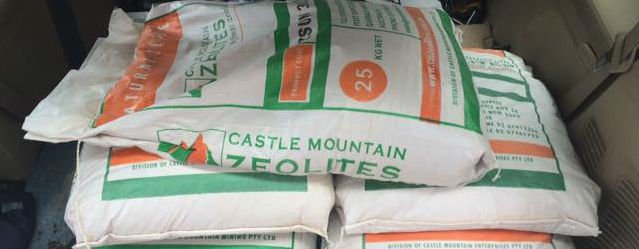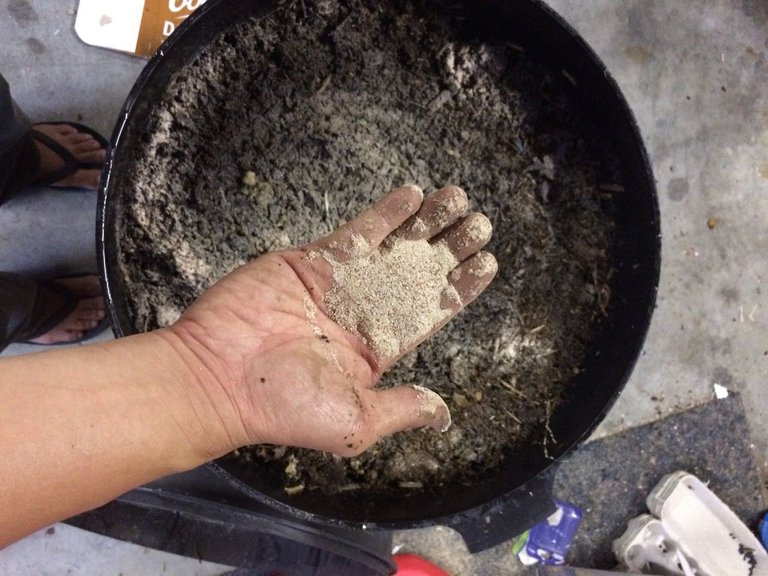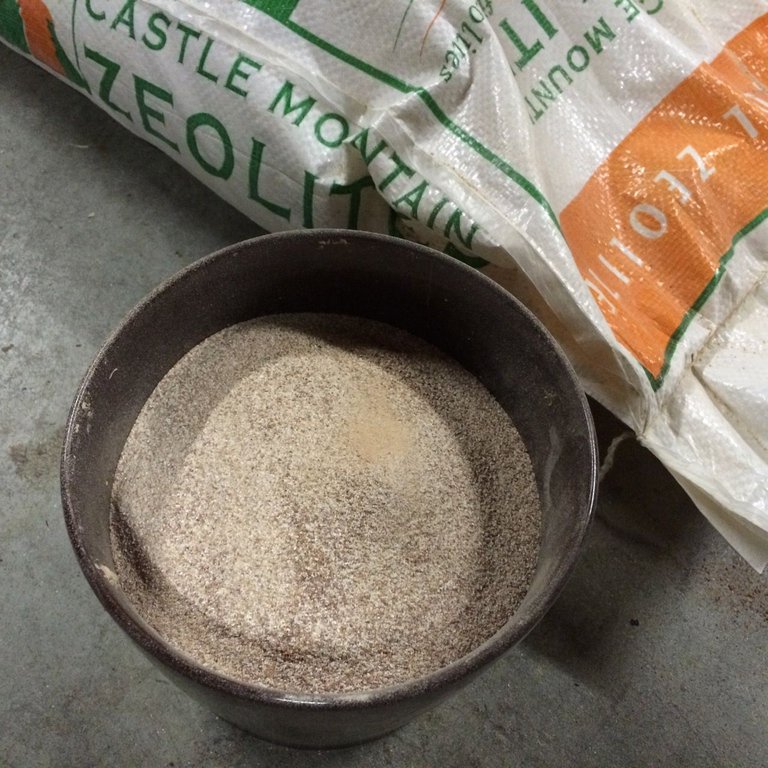There has been a lot of discussion about the use of rock dust in the garden and in a worm farm or compost bin. It is said that rock dust will add trace minerals to your garden and keep your soil and plants healthy. But rock dust can be expensive depending on the type and its availability in your location, so is it worth using it?

Today, I wanted to share my personal opinion about this and explain why I chose to use Zeolite with garden and composting setups.
First, what is a rock dust?
Wikipedia defines rock dust as: "Rock dust, also known as rock powders, rock minerals, rock flour, soil remineralization, and mineral fines, consists of finely crushed rock, processed by natural or mechanical means, containing minerals and trace elements widely used in organic farming practices."
Depending on the type of rock dust the mineral composition will be different but most will contain at least calcium, magnesium, potassium, phosphorus which you have probably recognized. These a present in a lot of commercial fertilizers.
A very popular rock dust is Azomite, it is claimed that it contains 70 types of trace minerals which is why gardeners add it to their soil mixes. In Australia however, Azomite is pretty expensive (not harvested locally) which put me off from buying it. The local alternative we have is Zeolite which has more or less the same mineral count.
Do I need to add minerals to my garden?
Now that's a tricky question. I've heard diverging opinions on this and tend to think that you don't if you plant straight in your garden but if you have raised beds or pots and use your own potting mix made of organic matter only then maybe adding some trace minerals would be a good idea. Trace minerals are important for plants health and help them boost their immune system.
My garden bein mostly raised beds on top of concrete floor and pots, I decided I want to add some Zeolite.
Although Zeolite is still cheaper than Azomite in Australia, getting some is still a bit dear. Luckily for me the quarry is "only" three hours drive from my place. So I decided one day to make a day trip with a friend and went fetching 5x 25kg bags. The trip was worth it as, including fuel, one 25kg bag cost me just a bit more than a single bag of 2kg bought on eBay... And after 6 months of use in my garden and worm farm, I still have a bit over than 4 bags left, but this is because I had to setup 5 raised beds. Now I expect the remaining bags to last me quite a while so I started selling some worm farm conditioner (more on this later).
I don't need more trace mineral in my soil, can Zeolite still be useful for me?
One thing I learned after buying the Zeolite is it is a quite special rock dust. It has a porous microstructure which allows it to act as a sponge. As such, I think it is similar to biochar, it can trap nutrient, water and other elements then slowly release them back to the plants when they need them.
Here are some ways Zeolite can be used for:
Vermiculture: Traps nitrogen through cation-exchange, eliminates odors in worm farms, absorbs and holds heavy metals, stabilizes the pH value of worm beds; increases the nutrient value of vermicast.

Horticulture: Retains nutrients longer to lower fertilizer costs; substantial yield improvements; less nutrient leeching; long-term soil improvement.
Stockfeeds: Diminishes ammonia toxicity and scouring; increases nitrogen levels in manures for higher fertilizer values; reduces odor levels in sheds and a safer, slow release off ammonia from urea; produces lower mortality rates in fowls and limits the moisture levels in organic wastes.
Aquaculture: Decreases ammonia levels in ponds and tanks; filtrates water for cleaner tanks.
So when you add Zeolite as instructed, it can help reduce nutrient leaching and increase moisture retention in your garden but it can also reduce odor in compost pile and worm farms too.
However, there are many different types of Zeolite and they are not all born equal. So you need to do your homework and check the properties of the Zeolite available in your area.
Some products you didn't know contain Zeolite:
Worm farm and compost conditioners are usually used to control pH in a worm farm or compost bin. pH control is made possible by the presence of calcium, usually in the form of calcium carbonate (CaCO3). They also claim to add trace elements and reduce odor, does that sound familiar?
Some pool filter media are just rebranded Zeolite but their grade is different.
This takes us to grades of Zeolite. Zeolite is available in different grades (sizes) going from 40 microns to 8mm. The finer the more expensive, the coarser the less effective in short term. I'm using a 0.00 to 0.50mm size Zeolite which is what the supplier recommends for gardening and worm farms.
How do I use it?
I personally use it as part of my soil mix, for every wheelbarrow full of mix I add and mix between 250 and 750 grams of Zeolite per square meters. Then when the raised bed is full of the mix I add another layer of Zeolite to the surface and cover it with mulch.
Another use of mine is a homemade worm farm and compost conditioner which is as good as the commercial one. The mix is made of garden lime and Zeolite, if you want more details, check my blog post on this here:

Homemade worm farm and compost conditioner
Lastly, I also mix it with horse manure as I pile it up and add a last layer on the top surface area to control odor and it really seems to work. And from what I read Zeolite has an affinity with ammonium so it is a way of capturing ammonium from fresh manure. But if it was for odor only, then just a good layer of aged grass clippings or sugarcane mulch is also very effective. I live in a suburb area and one time after piling up a one cubic meter pile of horse manure in a hot day, there was a strong smell of manure that has invaded the whole backyard, luckily the neighbors were not home that weekend as I only noticed the following day when I stepped into the garden to check the temperature of the pile. Covering the pile with sugarcane mulch shut off the smell very quickly. Later on, I also had success with grass clippings and Zeolite.
I will soon make an experiment with adding Zeolite to my BSFL bin to see if it can help controlling odor in the bin. I will surely give you an update.
What are the results with the plants?
To be honest, I'm not sure because I don't have anything to compare to. The plants do seem to be healthy and they do taste good, at least it has not been worse. I might need to do some experiments one day.
I'm not trying to convince you to use or not use Rock Dust, but more throwing some info out there for you to investigate and decide for yourself.
Here are more resources:
- Zeolite use cases
- Zeolite for animal & environment health
- Zeolite with dogs and cats
- Zeolite in the garden
- Zeoponics: Zeolite used for gardening in space
- Zeolite in composting
Credits
- The image at the top has been generated with the Canva app using my own photo.
- Thank you Ben Jammin to share your point of view
Related content
- Adding rockdust to a composting system
- What makes vermicompost a good fertilizer? A little intro to the soil food web
- Do worms really not eat meat. Understanding relative quantities
- How to feed your compost worms
- How to set up a worm bin
- How to build an aerated compost tea brewer
- Are you doing it right?
- What are the possible causes of mortality in compost worms
- What does a worm cocoon look like
- 10 myths in worm farming

Nice article. I've been researching this a lot recently. Just wondering if you know of any mineral or rockdust sources that are high in iodine? There are some minerals that contain it, and getting it from kelp meal can get expensive. But most rock dust products dont have a very accurate breakdown of the proportions of each mineral.
Keep up the good work.
Good question. To be honest, I’m not sure. I was going to say to use some seaweed solutions or fish amino acid (fish hydrolysate) which you can make yourself.
Alternatively you could breed black soldier fly larvae, feed them fish guts, collect them when they are mature, dry them out and blend them into powder. As bonus you would get some chitin too